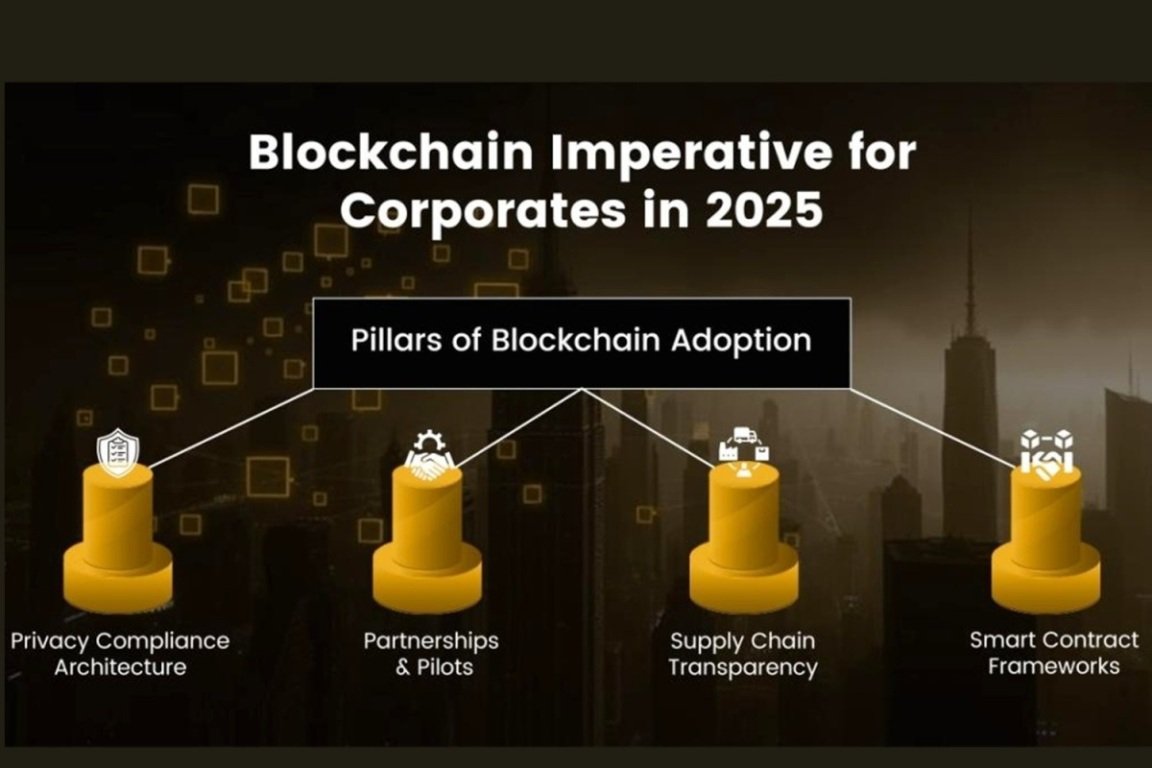 The corporate world stands at the brink of a technological revolution—one that is no longer a distant possibility but an urgent necessity. Blockchain, once viewed with skepticism, has evolved into a cornerstone of modern digital infrastructure. As we move toward 2025, businesses must recognize that blockchain adoption is not merely an advantage—it is a survival imperative.
The corporate world stands at the brink of a technological revolution—one that is no longer a distant possibility but an urgent necessity. Blockchain, once viewed with skepticism, has evolved into a cornerstone of modern digital infrastructure. As we move toward 2025, businesses must recognize that blockchain adoption is not merely an advantage—it is a survival imperative.
In this thought-provoking piece, Mr. Tapan Sangal, Director, KALP Decentra Foundation, lays out the undeniable case for why corporations must act now. With over three decades of expertise in consulting, technology, and regulatory innovation, Sangal highlights the rapid transformation of blockchain from a niche concept to a fundamental driver of trust, efficiency, and decentralization.
This article explores the shifting regulatory landscape, blockchain’s ability to redefine trust in transactions, and the four strategic pillars businesses must adopt to stay competitive.
2025: The Blockchain Imperative - Why Corporate Survival Depends on Acting Now
The future is already here – it’s just not evenly distributed.” – William Gibson
We stand at a critical inflection point in corporate history. The blockchain revolution, once dismissed as a speculative trend, has matured into an undeniable force reshaping global business operations. As we approach 2025, one truth becomes increasingly clear: blockchain adoption is no longer optional – it is a survival imperative.
The marketplace has fundamentally shifted. While businesses spent the last decade debating blockchain’s potential, the technology quietly transformed from an experimental concept into the backbone of modern digital infrastructure. Today’s regulatory environment has evolved from restriction to enablement, with governments worldwide establishing frameworks that not only permit but actively encourage blockchain integration.
This shift isn’t merely technological – it represents a fundamental change in how value, trust, and transactions function in our global economy. Companies that recognize and act on this transformation will thrive. Those that don't, risk becoming irrelevant in an increasingly decentralized world.
Technological Imperatives: Why Blockchain Can’t Wait
At its core, blockchain is a trust engine, enabling businesses to establish self-evident truth in transactions. Unlike traditional systems that rely on external validation (contracts, audits, certificates), blockchain makes truth intrinsic and immutable.
- Eliminating the Need for Intermediaries: Transactions become inherently verifiable, removing inefficiencies and reducing costs
- Decentralized Trust: Blockchain ensures that records are transparent, tamper-proof and cryptographically secured.
- Security & Efficiency: Blockchain minimizes fraud risks and enhances real-time tracking of assets, contracts, and transactions.
- Industry-Wide Applications: Supply chain management, healthcare, finance, and digital identity verification are already leveraging blockchain for enhanced transparency and automation.
Building the Basic Blockchain Strategy: 4 Pillars for 2025
A structured blockchain adoption framework ensures that corporations are future-ready. Here are four critical pillars:
1. Privacy Compliance Architecture
With data protection laws imposing strict penalties, blockchain offers cryptographic safeguards to enhance compliance.
- Example: A multinational corporation using subnet blockchains to store EU citizen data in GDPR-compliant nodes while maintaining jurisdiction-specific frameworks like India’s DPDPA.
- Actionable Step: Adopt privacy-preserving blockchain architectures (e.g.,KALP subnet frameworks) to ensure jurisdictional compliance and automated breach reporting.
2. Partnerships & Pilots
Successful blockchain adoption requires collaboration. Partnering with industry leaders like Ethereum, KALP, and other blockchain solution providers allows corporates to pilot real-world applications before full-scale deployment.
- Example: Luxury watch brands can partner with blockchain providers to enable immutable Proof of authenticity. The pilot focuses on product authenticity and supply chain visibility for a specific product line.
- Actionable Step: Partner with blockchain providers (e.g. Ethereum Hyperledger). Run small pilot projects with clear goals and KPIs. Focus on one problem and a particular product line and expand as result become visible.
3. Supply Chain Transparency
Using blockchain for real-time tracking, ESG reporting, and ethical sourcing builds trust and regulatory compliance.
- Example: Coffee companies can use blockchain to track beans from farm to cup. Consumers scan a QR code for origin and ethical sourcing info.
- Actionable Step: Map the supply chain and choose a tracking platform. Add data from all stakeholders in the supply chain and create easy access for users via apps.
4. Smart Contract Frameworks
Automating agreements through smart contracts reduces inefficiencies in payments, regulatory compliance, and legal documentation.
- Example: Real estate firm uses smart contracts for leases. Payments and renewals are automated, reducing paperwork.
- Actionable Step: Find processes for smart contracts (e.g., payments). Ensure legal compliance. Choose a blockchain platform to test and deploy automated smart contracts.
Corporations that ignore blockchain risk inefficiency, lost trust, and exclusion from next-gen financial ecosystems. The digital economy will not wait for late adopters. The message is clear: start now, start small, but start. Begin with a focused pilot project in 2025. Learn from it. Scale what works. Educate your leadership teams on blockchain’s strategic benefits. The goal isn’t to transform your entire organization overnight but to begin building the capabilities and understanding that will be critical for survival in the blockchain-enabled future.
The question is not whether blockchain will transform the world, but whether your corporation will be a part of that transformation or be swept aside by it.





 The corporate world stands at the brink of a technological revolution—one that is no longer a distant possibility but an urgent necessity. Blockchain, once viewed with skepticism, has evolved into a cornerstone of modern digital infrastructure. As we move toward 2025, businesses must recognize that blockchain adoption is not merely an advantage—it is a survival imperative.
The corporate world stands at the brink of a technological revolution—one that is no longer a distant possibility but an urgent necessity. Blockchain, once viewed with skepticism, has evolved into a cornerstone of modern digital infrastructure. As we move toward 2025, businesses must recognize that blockchain adoption is not merely an advantage—it is a survival imperative.


.jpg)










